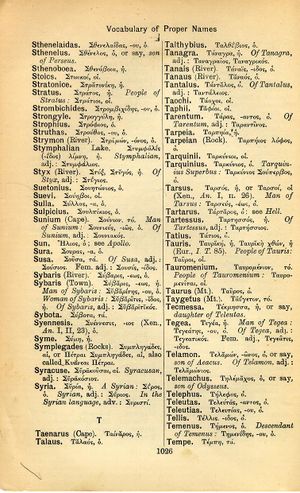Taurus
Ὥσπερ αὐτοῦ τοῦ ἡλίου μὴ ὄντος καυστικοῦ, ἀλλ' οὔσης ζωτικῆς καὶ ζωοποιοῦ θέρμης ἐν αὐτῷ καὶ ἀπλήκτου, ὁ ἀὴρ παθητικῶς δέχεται τὸ ἀπ' αὐτοῦ ϕῶς καὶ καυστικῶς· οὕτως οὖν ἁρμονίας οὔσης ἐν αὐτοῖς τινὸς καὶ ἑτέρου εἴδους ϕωνῆς ἡμεῖς παθητικῶς ἀκούομεν → Just as although the Sun itself does not cause burning but has a heat in it that is life-giving, life-engendering, and mild, the air receives light from it by being affected and burned, so also although there is a certain harmony and a different kind of voice in them, we hear it by being affected.
English > Greek (Woodhouse)
(Mt.) Ταῦρος, ὁ.
Latin > English (Lewis & Short)
Taurus: i, m.,
I a high mountainrange in the south-eastern part of Asia Minor, now Allah Dagh, Bulghar Dagh, etc., Mel. 1, 15, 2; Plin. 5, 27, 27, § 97; Varr. R. R. 2, 1, 8; Cic. Fam. 15, 1, 3; 15, 2, 2 al.: Tauri Pylae, a defile between Cappadocia and Cilicia, id. Att. 5, 20, 2.
Taurus: i, m.,
I a Roman proper name: M. Taurus, Cic. Q. Fr. 3, 1.

